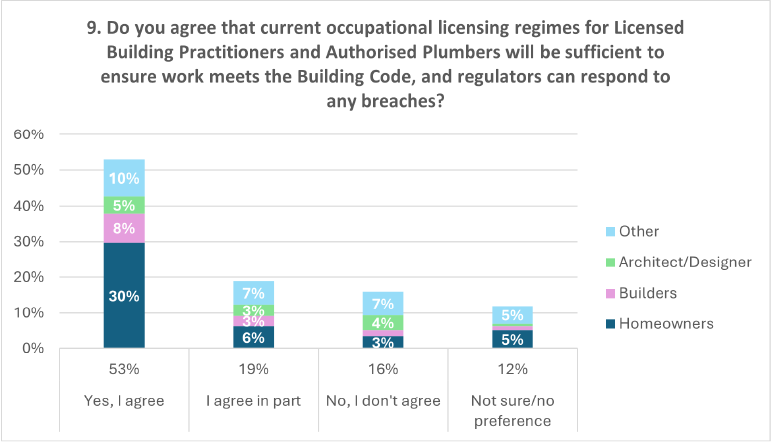Question 9
On this page
What was asked
Question 9: Do you agree that current occupational licensing regimes for Licensed Building Practitioners and Authorised Plumbers will be sufficient to ensure work meets the Building Code, and regulators can respond to any breaches?
What was proposed
All design and building work not covered by MultiProof or BuiltReady must be done (or supervised) by a Licensed Building Practitioner working within their scope of competency.
All plumbing and drain laying work must be done by an appropriately licensed person under the Plumbers, Gasfitters and Drainlayers Act 2006.
Summary of feedback
Overall, 1,450 submitters answered this question. Figure 7 below shows the breakdown of the responses.
Figure 7: Graph detailing the response to question 9

Text description for graph - Figure 7: Graph detailing the response to question 9
Submitters were also given the opportunity to explain their views on this question. 621 submitters provided a further explanation of their view.
Most responses to this question focused on the suitability and competency of the authorised tradespeople named in the proposal, rather than on the occupational licensing regimes themselves.
There was little comment on the occupational licensing regime for authorised plumbers. Where submissions were made on plumbers, concerns were raised around the potential inconsistency that the proposal may create if plumbing work can be completed without a consent in the context of a granny flat, but not outside of it.
The most common concern raised was a mistrust of Licensed Building Practitioners. Submitters stated that under the existing system Licensed Building Practitioners rely on the building consent system and building inspections as a quality assurance check, and that without it, there is significant risk of non-compliance.
Homeowners
Most homeowners (90%) agreed, or agreed in part, that relevant occupational licensing regimes would be sufficient to ensure work meets the Building Code and that regulators can respond to breaches.
Reasons for their support included:
- Licensed Building Practitioners and plumbers hold licences that show they are competent to complete their work to an acceptable standard, it makes sense to allow them to build a simple dwelling without council oversight.
- Licensed Building Practitioners and plumbers are capable of carrying out compliant work.
- Enforcement mechanisms built into the occupational regimes are sufficient to disincentivise poor-quality work.
Some homeowners did note that if an owner or builder has the necessary skills to construct a dwelling that meets the Building Code, they should not be precluded from accessing the consent exemption, despite not having formal qualifications.
Iwi, hapū and Māori
Iwi, hapū and Māori submitters were supportive of the requirement for all building work done under the proposed exemption to be carried out or supervised by authorised professionals, under current licensing regimes. Submitters noted that this requirement was necessary to ensure work was done in accordance with the Building Code and resulted in good quality and safe homes.
Councils (including Building Consent Authorities)
Most councils submitted that they do not have confidence in Licensed Building Practitioners to take on assurance responsibilities for these dwellings and that the Licensed Building Practitioner scheme does not have sufficient quality assurance built into it. As mentioned under Question 4, councils have significant concerns around existing failure rates for residential building work and commented that the proposal doesn’t include how these failures will be addressed under the policy.
Some councils were more confident in authorised plumbers, submitting that inspection failure rates for plumbing work are lower than residential building work.
To address concerns raised regarding the occupational licensing regimes for Licensed Building Practitioners, some councils suggested that a review of the Licensed Building Practitioner scheme is undertaken to ensure adequate provisions are in place, such as auditing, monitoring, and general quality assurance, to reduce the risk on homeowners in the case of building defects.
Both Christchurch City Council and Kāpiti District Council had unique suggestions for changes to the policy. Christchurch suggested a specific licence class be established for a Licensed Building Practitioner responsible for this work. Kāpiti suggested that one Licensed Building Practitioner be required to take overall site and build responsibility, as well as holding professional liability insurance.
Industry
Most builders stated that they had confidence in Licensed Building Practitioners and the occupational regime supporting them, with only a small percentage opposing the proposal.
Builders who supported the proposal commented that inspectors did not add value on projects as simple as granny flats, and that Licensed Building Practitioners were sufficiently competent to take on this work and carry the associated liability.
Those builders who disagreed with the proposal submitted that it was still necessary to retain some level of oversight and assurance of work carried out by Licensed Building Practitioners. In particular, New Zealand Certified Builders recommended a two-step approval process consisting of design-checks and then final inspection by a Licensed Building Practitioner, Site License holder.
Architects and designers consistently raised concerns around monitoring and quality assurance. Submitters stated that plan-checks and site inspections were a necessary part of the building process to ensure that work meets the Building Code.
The Insurance Council submitted that the proposal was unclear on how councils, industry, and future homeowners could be assured that work was carried out by regulated professionals, and not by unlicensed or unauthorised tradespeople.

